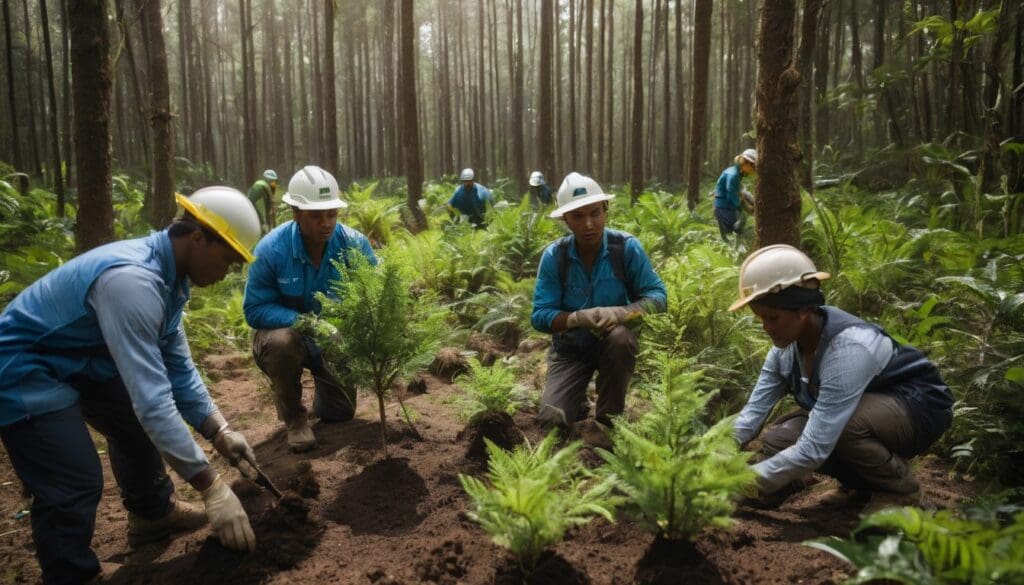As our world grows greener, jobs in sustainability are booming. Yet there’s a catch: many industries lack skilled workers ready for this eco-friendly shift. Our blog will explore practical ways to close this skills gap and build a workforce that’s as environmentally savvy as it is robust.
Keep reading to find your place in the green revolution!
Key Takeaways
- Investment in training programmes is essential to fill the green skills gap and support jobs such as solar panel installers and wind turbine technicians.
- Partnerships between industries and educational institutions help develop relevant curricula for sustainable jobs, ensuring graduates have the right skills.
- Promoting diversity in the green workforce through inclusive hiring practices allows for a more equitable environment sector.
- NYSERDA’s commitment to clean energy workforce development includes hands-on renewable technology training and local partnerships to improve job placement.
- Green career opportunities require various certifications, from LEED accreditation to sustainability management, which can be obtained through targeted educational resources.
Understanding the Green Skills Gap
The demand for green jobs is growing, but there aren’t enough workers with the necessary skills to fill these positions. This gap has significant impacts on both the economy and the environment.
Demand for Green Jobs is Outpacing Workers Prepared to Fill Them
As the world pushes towards a more sustainable future, industries are creating a surge in clean energy jobs. Solar panel installers, wind turbine technicians and energy efficiency auditors are just some of the roles growing faster than job seekers can train for them.
This burgeoning demand signals a positive shift but also highlights a critical need for skilled workers with green technology skills.
Companies and governments urgently require personnel well-versed in sustainability workforce development to meet their environmental targets. However, without enough trained professionals, initiatives like lowering carbon footprints and advancing renewable energy training may stall.
Building a green workforce is not only vital for our planet; it’s an economic imperative that calls for immediate action in environmental workforce development and green job training programs.
Impact of Green Skills Gap on Economy and Environment
The green skills gap is affecting the economy and the environment. The demand for green jobs exceeds the number of workers prepared to fill them, leading to missed opportunities for economic growth and environmental sustainability.
As a result, businesses struggle to find qualified candidates to push forward sustainable energy initiatives and conservation efforts essential for addressing climate change.
This skills gap also hinders the transition towards a resilient clean energy economy, slowing down progress in adopting sustainable energy sources and implementing eco-friendly practices.
By addressing this gap through workforce training programmes and inclusive development initiatives, we can bolster both our economy and environmental stewardship. Supporting conservation efforts begins with equipping individuals with the necessary skills to drive change toward greener practices – ultimately benefitting our planet’s future.
Strategies to Address the Green Skills Gap
Investing in training and workforce development programmes can help bridge the green skills gap, while partnering with education providers and promoting inclusion and equity in the green workforce are also crucial strategies.
Investing in Training and Workforce Development Programmes
Invest in training and workforce development programmes to equip individuals with the necessary skills to thrive in the green economy. This investment can help bridge the green skills gap and create a more sustainable future for all.
- Provide comprehensive training on energy efficiency workforce skills, equipping individuals with the knowledge to contribute to eco-friendly initiatives and reduce carbon footprint.
- Offer specialised programmes in sustainable building training, preparing workers for roles that focus on environmentally conscious construction practices and materials.
- Develop environmental education initiatives to raise awareness and foster a culture of sustainability, empowering individuals to make informed decisions in their professional roles.
- Implement conservation workforce training to cultivate expertise in protecting natural resources and preserving the environment for future generations.
- Support climate change workforce initiatives by providing training on renewable energy technologies, enabling workers to contribute to a greener, low-carbon future.
Partnering with Education Providers
To ensure a robust pipeline of skilled workers for green jobs, collaborating with education providers is crucial. Education institutions play a pivotal role in developing relevant curricula and training programmes to equip students with the necessary skills and knowledge required for the green workforce.
By partnering with universities, colleges, and vocational schools, industry stakeholders can influence the development of courses tailored to meet the demands of eco-friendly industries, ensuring that graduates are prepared to step into sustainable careers.
Such collaborations also offer opportunities for internships, apprenticeships, and practical experience within environmentally focused sectors.
Furthermore, partnerships with education providers facilitate ongoing dialogue between industry professionals and academic experts. This collaboration leads to curriculum adjustments that reflect real-time market needs in sustainability-driven fields.
Promoting Inclusion and Equity in the Green Workforce
Partnering with education providers is crucial, but so is the need to ensure that the green workforce is inclusive and equitable. This can be achieved by actively recruiting and hiring individuals from diverse backgrounds and underrepresented communities.
Providing access to training, education, and career advancement opportunities for all individuals regardless of their race, gender, or socioeconomic status is essential in building a truly inclusive green economy.
Creating partnerships with community-based organisations and implementing outreach programmes can help bring awareness about green job opportunities to marginalised groups. By fostering an environment that promotes diversity and equity within the green industry, we can work towards a more sustainable future where everyone has an equal opportunity to contribute to environmental conservation efforts.
NYSERDA’s Workforce Development Initiatives
NYSERDA has been actively involved in clean energy workforce development and training, as well as partnering with local organisations to address the green skills gap. Their initiatives focus on building a diverse and skilled workforce for the future of sustainable energy.
Clean Energy Workforce Development and Training
NYSERDA focuses on clean energy workforce development and training, enabling individuals to gain the skills required for jobs in the green industry. It offers comprehensive initiatives to bridge the green skills gap and support a sustainable future.
- Providing hands-on training in renewable energy technologies such as solar panel installation, wind turbine maintenance, and energy-efficient building design.
- Collaborating with industry experts to develop cutting – edge curriculum that aligns with the latest advancements in clean energy.
- Offering apprenticeship and mentorship programs to ensure practical experience alongside theoretical knowledge.
- Partnering with local businesses and organisations to create job placement opportunities for graduates of clean energy training programmes.
- Facilitating access to resources and tools for continuous learning and skill development within the clean energy sector.
Partnerships with Local Organisations
NYSERDA collaborates with local organisations to boost green workforce development. These partnerships foster tailored training programmes and initiatives, addressing the demand for eco-friendly skills.
By teaming up with community groups and educational institutions, NYSERDA ensures inclusive and sustainable workforce training. Local collaborations provide valuable insights into regional employment needs, enhancing the effectiveness of green job training efforts.
Networking with local organisations sharpens the focus on specific environmental challenges in diverse communities. These partnerships strengthen connections between employers, workers, and educators in fostering a skilled green workforce.
Opportunities for Building a Green Career
Discover the skills and certifications needed to thrive in the green workforce. Explore resources for job seekers, students, and building owners looking to lower their carbon footprint.
Skills and Certifications Needed in the Green Workforce
- Renewable Energy Certification – Acquiring knowledge and expertise in renewable energy sources such as solar, wind, or hydroelectric power is crucial for pursuing careers in sustainable energy.
- LEED Accreditation – Being certified as a Leadership in Energy and Environmental Design (LEED) professional demonstrates proficiency in constructing environmentally friendly buildings and sustainable design principles.
- Environmental Engineering Degree – Obtaining a degree in environmental engineering equips individuals with the necessary skills to design and implement solutions addressing environmental challenges.
- Sustainability Management Certification – A certification in sustainability management prepares individuals to integrate sustainable practices into various business operations.
- Green Building Certification – Gaining credentials in green building practices enables professionals to create resource-efficient and environmentally responsible structures.
- Carbon Management Training – Learning how to measure, monitor, and manage carbon emissions is vital for mitigating climate change impacts within organisations.
- Circular Economy Expertise – Understanding principles of a circular economy helps professionals develop strategies for minimising waste and promoting efficient resource use.
- Eco-friendly Supply Chain Management Course – Equipping oneself with knowledge of sustainable supply chain practices helps organisations achieve environmental goals while optimising their operations.
Resources for Job Seekers and Students
Explore a variety of resources designed to assist job seekers and students in pursuing green career opportunities. Access training programmes tailored to develop essential environmental skills and certifications necessary for entering the ecofriendly workforce.
Utilise inclusive workforce development initiatives aimed at promoting equity and diversity within the sustainable job market, providing equal access for all individuals interested in building a green career.
Engage with educational partners to gain valuable insight into the clean energy industry, ensuring that you are well-prepared to contribute positively towards environmental conservation.
Take advantage of comprehensive programmes specifically catered to building owners and managers, equipping them with the knowledge required to lower carbon footprints within their respective industries.
Programmes for Building Owners and Managers to Lower Carbon Footprint
Building owners and managers can access various programmes to reduce their properties’ carbon footprint. These include energy efficiency training, renewable energy installation courses, and sustainability certification workshops.
These programmes equip building professionals with the skills and knowledge needed to implement eco-friendly practices, adopt green technologies, and reduce energy consumption in their buildings.
By participating in these initiatives, building owners and managers can lower operational costs while contributing to environmental conservation efforts. Additionally, implementing sustainable practices can enhance the market value of properties by appealing to environmentally conscious tenants and businesses seeking eco-friendly spaces.
Conclusion
In conclusion, addressing the green skills gap is crucial for a sustainable future. Investing in training and partnering with education providers are key strategies. NYSERDA’s initiatives and opportunities pave the way for building a skilled green workforce.
With the right skills and resources, individuals can contribute to a more eco-friendly workforce and environment. Taking action now will ensure a brighter, greener tomorrow for all.
FAQs
1. What is a green workforce?
A green workforce consists of workers who have special training and skills needed for ecofriendly industries, such as clean energy job training and environmental work.
2. Why are workforce training programs important in building a green workforce?
Workforce training programs provide essential knowledge and expertise on green building skills that help create an environmentally sustainable economy.
3. Can anyone join green skills training courses?
Yes, anyone interested in contributing to a cleaner, greener future can gain valuable insights from participating in ecofriendly workforce development courses.
4. How do environmental training programs prepare one for a career in the green industry?
Environmental training programs equip individuals with the necessary green job skills to excel in fields focused on sustainability and managing our resources responsibly.



